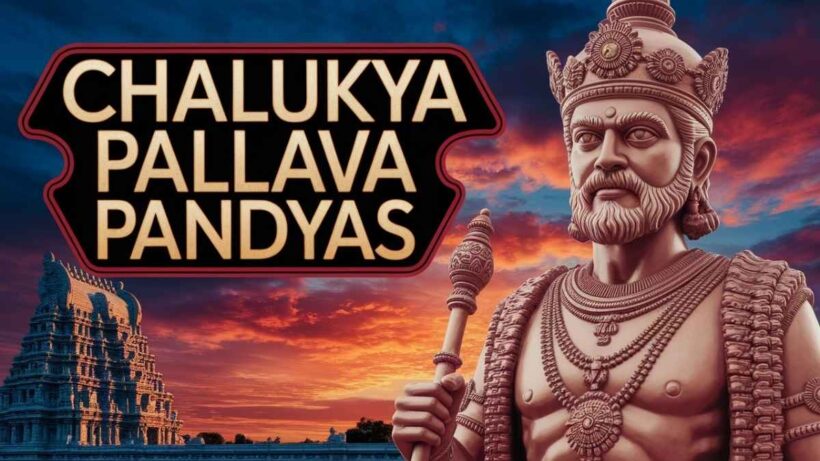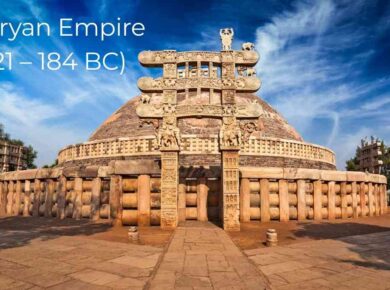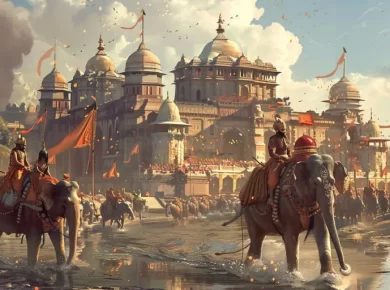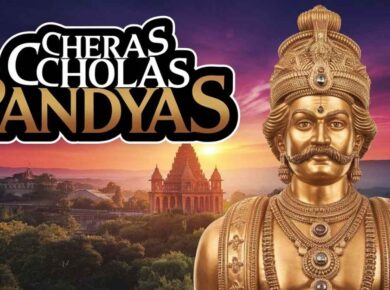Chalukya, Pallava, Pandyas
- 600 AD: 3 Main Kingdoms in South: Chalukya (Badami); Pallava (Kanchi); Pandyas (Madurai)
- Primary Language: Sanskrit
- Rise of agrarian economy + No megaliths + Decline in trade
- Numerous grants were made to Brahamanas
- Marked by beginning of construction of stone temple of Vishnu & Shiva
- Jainism was confined to Maharashtra
Chalukyas of Badami
- Northern Maharashtra → Vakatas (Brahamanas) Succeded Satavahanas
- Vakatas were Succeeded by Chalukyas of Badami (Vatapi)
- Chalukyas of Badami claimed their descendent from Moon/Manu/Brahma
- Capital → Badami (Vatapi) at Bijapur (Karnataka)
Greatest Ruler → Pulakeshin 2
- Aihole inscription by Ravikriti in Sanskrit
- Defeated Harshas Army advancing in Deccan on banks of Narmada
Architecture by Chalukyas
- Developed Deccan/ Vesara style Temples.
- Developed Papanatha & Virupaksha @ Pattadakal (City of famous 10 temples)
Pallavas
- Eastern Peninsula → Ikshvakus (Suryavansh) Succeeded Satavahans
- Ikshvakus were succeeded by Pallavas
- Pallavas were called “Creeper/ Tondai / Robbers)
- Capital → Kanchipuram
- Conflict with kadambas (Founded by Mayurasharman : Capital → Vaijayanti)
Great Pallava Ruler → Narasimhavarman
- Defeated Pulakeshin 2
- Occupied Vatapi & entitled Vatapikonda
- Founded Port city of Mahabalipuram (Now Mamallapuram)
Pallavas Dravidian Style Temples
| 7 Ratha temple | Mahabalipuram | Rock cut |
| Shore Temple | Mahabalipuram | Free standing |
| Vaikuntha Perumal | Mahabalipuram | Free standing |
| Kailashnath Temple | Kanchipuram | Free standing |
Conflict with Kalbhras
- Pallavas, Chalukyas & Kadambas → All 3 were brahamans
- Followed brahamanism with vedic sacrifices
- Made numerous land grants to Brahamanas
- Kalbhras Patronised Buddhism & Buddhist monasteries
- Land grants to brahamanas led to revolt of Kalbhras mainly to put an end to Brahamadeya right to Brahamanas
Rural Structure
Generally 3 types of villages, namely Ur, Sabha & Nagaram
| Ur | Inhabited by peasants who held their land in common & village headman collected tax & paid on everyone’s behalf |
| Sabha | Brahamdeya or land granted to Brahamanas (Agrahara villages) |
| Nagaram | Inhabited by merchants & traders |
In Chalukya kingdom rural affairs were managed by village elders known as “Mahajana”











